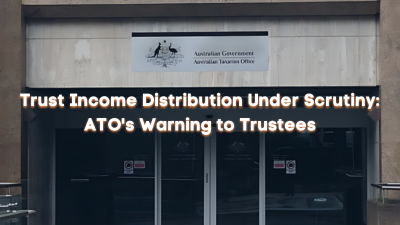The Australian Taxation Office (ATO) has issued a stern warning to trustees, emphasizing the importance of carefully considering how and to whom trust income is distributed. In recent years, trust distribution arrangements have faced increasing scrutiny, and trustees must meticulously review their practices to ensure compliance with relevant regulations. It is a good time to recapitulate this before the end of financial year distribution.
Understand your Trust Deed
One of the main concerns is that trustees may not be looking at their trust deed before distributing income. The trust deed is a legal document that outlines what the trust can do and who can receive income. It’s crucial to review this document before making any decisions.
Steps for Reviewing Your Trust Deed
- Check the Deed and Amendments: Make sure that any actions taken by the trustees are in line with what the trust deed says.
- Vesting Date: The trust deed specifies the procedures when the trust vests. Upon vesting, trustees may be required to distribute income and property to designated beneficiaries, losing their discretion in this regard.
- Identify Beneficiaries: Determine who the beneficiaries are and understand their entitlements to income and capital.
- Resolution Timing and Requirements: Review any conditions for trustee resolutions, including deadlines and the need for written resolutions, eg. it has to be done by 30 June.
- Streaming Income: If you plan to allocate capital gains or franked distributions to certain beneficiaries, ensure the trust deed allows this.
Family Trust and Interposed Entity Elections
A family trust election ties the trust’s operations to a specific family group, helping protect losses and franking credits but potentially causing tax issues if misused. An interposed entity election brings an entity into an individual’s family group. Trustees need to understand the consequences of these elections before distributing income, as distributing outside the family group can result in hefty family trust distribution taxes.
Who really benefits?
The ATO is also vigilant about arrangements where income is allocated to beneficiaries who do not actually receive the financial benefit. If such arrangements reduce the overall tax paid, they are likely to draw the ATO’s attention.
Increased Reporting Requirements
Recent changes mean more detailed information is now required on tax returns about trust income distributions. These include:
- Trust Tax Return: Four new capital gains tax labels have been added, requiring information that matches what beneficiaries report in their returns.
- Beneficiaries: All beneficiaries must now file a new trust income schedule that matches the trust’s distribution statement.
The Importance of Compliance
Trusts offer significant flexibility in income distribution, but this comes with stringent compliance and control requirements. The ATO is closely monitoring how trusts distribute income and the associated tax implications.
Trustees must take these warnings seriously and diligently review their trust deeds and distribution arrangements to align with regulatory expectations. Ensuring proper compliance not only safeguards against potential penalties but also maintains the integrity and intended benefits of the trust structure.
Pitt Martin Group is a CPA accounting firm, providing services including taxation, accounting, business consulting, self-managed superannuation funds, auditing and mortgage & finance. We spend hundreds of hours each year on training and researching new tax laws to ensure our clients can maximize legitimate tax benefit. Our contact information are phone +61292213345 or email info@pittmartingroup.com.au. Pitt Martin Group is located in the convenient transportation hub of Sydney’s central business district. Our honours include the 2018 CPA NSW President’s Award for Excellence, the 2020 Australian Small Business Champion Award Finalist, the 2021 Australia’s well-known media ‘Accountants Daily’ the Accounting Firm of the Year Award Finalist and the 2022 Start-up Firm of the Year Award Finalist, and the 2023 Hong Kong-Australia Business Association Business Award Finalist.
Pitt Martin Group qualifications include over fifteen years of professional experience in accounting industry, membership certification of the Australian Society of Certified Practising Accountants (CPA), Australian Taxation Registered Agents, certified External Examiner of the Law Societies of New South Wales, Victoria, and Western Australia Law Trust Accounts, membership certification of the Finance Brokers Association of Australia Limited (FBAA), Registered Agents of the Australian Securities and Investments Commission (ASIC), certified Advisor of accounting software such as XERO, QUICKBOOKS, MYOB, etc.
This content is for reference only and does not constitute advice on any individual or group’s specific situation. Any individual or group should take action only after consulting with professionals. Due to the timeliness of tax laws, we have endeavoured to provide timely and accurate information at the time of publication, but cannot guarantee that the content stated will remain applicable in the future. Please indicate the source when forwarding this content.
By Angela Abejo @ Pitt Martin Tax

